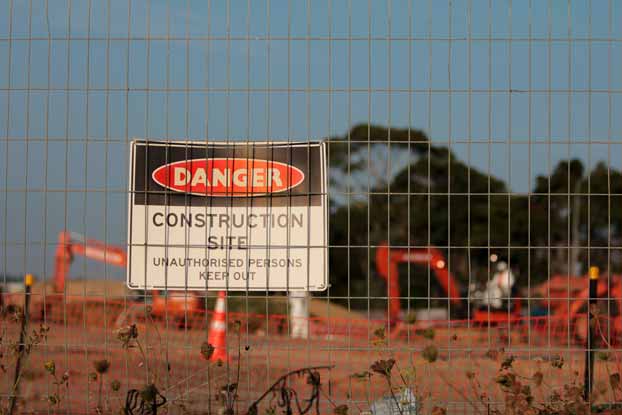How safe do you feel when on a construction site?

Do you worry about your safety and the safety of your colleagues?
Numerous construction companies have been fined for health and safety breaches with one company very recently having to settle a claim for an injury to a worker at £900,000! Another construction company in Bolton was fined after repeated health and safety breaches were found on site. Prior HSE inspections meant that multiple prohibition and improvement notices were issued to the company. Including working at height breaches on every single visit!
Other breaches such as sleeping on site, lack of guarding on a metal guillotine as well as electrical issues were also found, HSE found that the company had failed to properly assess, plan and implement health and safety procedures.
But what can you do to protect yourself and your colleagues at the workplace?
If you are a worker on the site, a site manager or another role, these 5 tips could help to save your life (or your business!).
Our Top Site Safety Tips
First, it must be mentioned that any new worker to a construction site should be briefed in full on all health and safety aspects at that site. This should be before they even set foot on site itself. A check must also be carried out by a senior that they have the right PPE for the site and their role. A specific site orientation including a brief of the plant, machinery, toxins and specific local hazards on and near site is vital.
It is also vital that a worker is qualified for all work in which they are contracted to fulfil. For example, when a worker is sent through RecruitEasy they are properly vetted and checked to ensure they hold the specific experience and qualifications/tickets in which they need to carry out a role. RecruitEasy would not send a 360 Excavator Operator onto site without having a checked NPORS or CPCS ticket for 360 Excavators. Not to mention other site/job requirements such as a CSCS card or specific experience. If a worker is not suitably qualified to operate or fulfil a job they are a risk to both the employer and anybody on site, including themselves.
The Risk of CollapseThis can be a death sentence when on a construction site. It’s always best to be fully aware of any site specifics so that you can be best prepared for what structures may be around you during work.Good preparation from start to finish could minimise the risk of injury and fatalities. For example, risk assessment and precautionary measures should always be in place before work commences. Scaffolding should also undergo additional risk assessment and only be erected by fully qualified and capable workers.
ElectricityAlthough we may think it’s obvious, electricity accounts for nearly twice as many deaths within the construction sector compared to all other industries.All workers, and not only electricians, should be aware of the presence of electrical cables and overhead wiring. For example, machine operators should be aware of the placement of both overhead and underground cables. Plant operators do not want to dig up an electric cable (not only because of possible electrocution but the cost!) Only qualified electricians should carry out work on electricals.
Working at heightWorking at height is incredibly dangerous for workers, not only for anyone working at height but for people underneath as any tools or materials falling could harm or fatally injure others.
All workers required to work at height should have the correct training and know the correct procedure for doing so. The risk assessment for falling objects should be stringent and taken seriously and hard hats should always be worn when required.
AwarenessAgain this may be obvious, but a construction site is a constantly changing environment. You MUST be aware of your surroundings at all times. You wouldn’t want to accidentally walk backward off the scaffolding ..
With machines operated in over
80% of all construction sites, proper due care must be taken when travelling across the site, especially with personal protective equipment that may affect your hearing or awareness. Not to mention the numerous slip, trip and fall hazards that must be avoided across the site, which self-awareness will prevent.
NoiseHuman ears are very sensitive to loud noises and construction sites are often full of them.
The insides of your ears are extremely delicate, and the proper precautions must be taken to avoid gradual or sudden hearing loss or damage from loud noises.
When starting work on a new construction site, make sure you are aware what tools and machinery may be used within your work area and ensure you bring the relevant sound protective gear for your ears. Nobody wants to have hearing issues – don’t let these warnings fall on deaf ears!!
So what?
Overall, at all levels of construction, risk management should be used on a dynamic basis to prevent incidents and provide a safe working environment. Although site management and companies have the responsibility for most safety and risk management, it is the responsibility of site workers to follow guidance and procedures to ensure their own personal safety and that of others.
Some of the burden of safety checks and monitoring can be reduced through using a specialist construction recruitment agency with a wealth of knowledge and expertise in both finding workers and vetting them. RecruitEasy has many years of experience in all construction trades recruitment and has a large database of workers in which to find the perfect candidate. Are you
looking for a worker? Or
perhaps work?Want to read more on workplace health and safety or about the construction industry? Why not read
this blog on labour shortages.Health and Safety England has further advice on specific safety advice for
construction workers and for
Contractors.
Why not read another blog?
